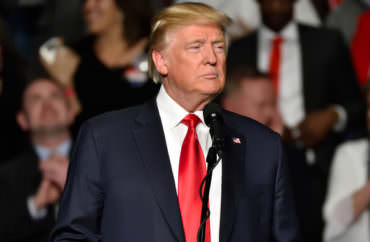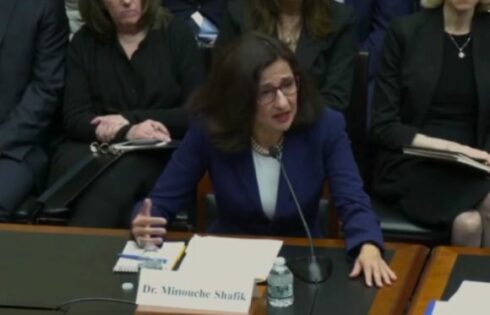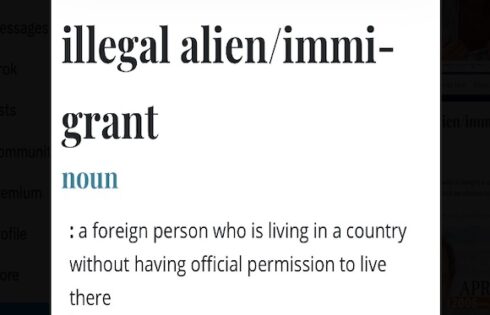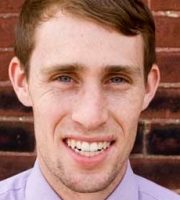
Editor’s Note: This is the sixth and final article in a series reporting on the American Studies Association’s annual meeting, an academic conference held Nov. 9-12 in Chicago.
CHICAGO – Professors have accepted the reality of Donald Trump’s presidency, and have now turned their sights on strategizing ways to teach against the president’s agenda.
That much was clear after hundreds of scholars descended upon Chicago earlier this month for a prominent academic conference. Coincidentally hosted at a hotel near the city’s Trump Tower, the 45th president loomed large at the American Studies Association’s annual meeting.
Themed around “pedagogies of dissent,” the conference included a number of presentations highlighting that scholars hope to play an outsized role in fighting back against Trump and his conservative agenda.
With many liberals and leftists continuing to rally around the #NotMyPresident campaign, a topic Grand Valley State University professor Jae Basiliere discussed, the American Studies Association’s conference indicated professors are accepting him as a commander-in-chief.
“I don’t like it. I can work to resist it everyday, but Donald Trump is absolutely my president,” Basiliere said in her presentation.
Yet, acceptance of Trump’s presidency doesn’t mean embracing it, as highlighted by several panels at the conference that seem to suggest confronting Trump’s presidency ultimately means fighting back against his agenda.
Though, fighting back against that agenda could also mean losing more support for higher education, especially from right-of-center Americans who are already growing weary at the bias found at college campuses.
Take for an instance a session titled “Teaching Difficult ‘Subjects’ in Difficult Times,” a small group discussion intended to “present strategies and best practices for teaching in an era of right-wing conservatism.”
Other panels held similar missions, with focuses on “pedagogies against right-wing ideologies” and teaching issues such as capitalism, whiteness and Islam “before and after Trump.”
While these panels only made up a small percentage of the conference’s nearly 500 sessions, they spotlight what seems to be the ever growing need of professors and administrators to speak out against Trump and conservative viewpoints.
This trend isn’t relegated solely to the American Studies Association. It pervades higher education. It’s seen in the university professors who’ve signed on to letters condemning Trump’s travel ban or pledging more action regarding climate change. It’s even been seen recently with university leaders taking an activist tone on the congressional Republicans’ tax plan.
And when it comes to professors, this trend exposes itself in incendiary tweets that range on topics from “white genocide” to “dead cops.”
Where does this trend originate? Kandice Chuh, the American Studies Association’s president, seemed to offer some hints in her keynote address by suggesting that scholars see academic freedom and the state of higher education as being in perilous positions, partly stemming from conservative lawmakers and groups.
The English professor noted that government action and ideological groups create “the sense that we are under siege.”
“That academic freedom is under attack is something of a commonplace observation and understandably so. There is ample evidence to be drawn from across the world and more locally in support of such a claim,” Chuh said.
Yet, not all of the professors who touched on Trump at the conference outright dismissed his ideology or supporters, even if they disagree with them. Some scholars urged colleagues to reach out to right-of-center students and to make attempts to understand why Trump appealed to such a large swath of Americans.
Basiliere, the Grand Valley State University professor, warned professors to resist directing hostility toward conservative students. She suggested her fellow professors “train our students to make nuanced arguments, teach them to communicate productively and civilly with people who hold competing ideologies.”
Yet, these remarks coupled with the anti-Trump sessions, pose a challenge for professors and higher education at large: How can they simultaneously reach out to right-of-center students while also explicitly teaching against conservative beliefs at the same time?
This is a question these professors should take seriously. If not, higher education risks losing more of its dwindling support, especially among conservatives. A Pew Research Center report issued this summer found a majority of Republicans think higher education has a negative impact on the nation.
MORE: Professor — Liberals must take partial responsibility for Trump presidency
MORE: ‘The American outer class’: Professor explains to peers why Trump won
IMAGE: Evan El-Amin/Shutterstock
Like The College Fix on Facebook / Follow us on Twitter




Please join the conversation about our stories on Facebook, Twitter, Instagram, Reddit, MeWe, Rumble, Gab, Minds and Gettr.